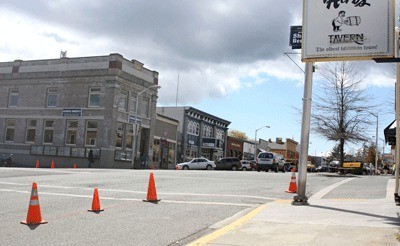Every community in the world faces some version of this problem.
Pollutants from cars and other aspects of daily life run downhill when they hit paved surfaces. Every community has some body of water where this stuff collects.
For us, most of the runoff, and pollutants, gets into the pipes under the streets and runs into our harbor.
For the last few years, Friday Harbor has been grappling with this problem and there has been a lot of activity around this issue. Samples have been collected and analyzed, Town workers have increased the sweeping of the streets and tracked down buildings where indoor plumbing had been incorrectly hooked up to the storm drains, instead of going to the treatment plant.
Many problems have been corrected.
Last summer and fall, it appeared that things were getting better. Concentrations in runoff were down. But with the winter rains, some of the problems returned. It is time for a different tack.
Enter the ‘raingarden’.
With grant funding from the Washington Department of Ecology’s Local Source Control Program, the Town of Friday Harbor and San Juan County Marine Resources Committee are planning to install a raingarden demonstration project along Spring Street. Its purpose is to act as a real world experiment to see if larger application of this technology might be able to purify the runoff from the mostly paved core of the town.
Raingardens are a relatively new technology often employed as part of a Low Impact Development strategy to reduce chemicals in runoff water. They use a special soil mix and plant community that essentially act as a filter.
Johannes Krieger, a local business owner and MRC member, is leading this project. He has worked with Town officials, engineers and local contractors to put in place a plan to install a raingarden at the intersection of First and Spring streets.
If all goes well, this raingarden will be in place by mid-May, positioned at the north corner by Herb’s Tavern. Construction is expected to last two to four weeks.
This one small raingarden is not intended to cure Friday Harbor’s runoff woes. It is intended to determine if this approach, applied on a larger scale, can significantly reduce pollutant concentrations in our runoff.
Testing will evaluate its effectiveness and the results will direct future efforts to address this problem. In the meantime, here are a few benefits these raingardens offer:
— Local jobs: Boundary Water, Inc., with help from 2020 Engineering, is providing the engineering and surveying for this project; local non-profit Kwiáht, using facilities leased from Friday Harbor Labs, will do sampling and chemical analyses, and Mike Carlson Enterprises will install the raingarden.
— Aesthetics: The raingardens will essentially look like perennial planting beds filled with cobble (to keep the soil from floating away). The plants (grasses & shrubs), selected primarily for their ability to treat runoff, will also help beautify the town.
— Volunteers: WSU and Master Gardeners have volunteered to help maintain the beds. Best of all, this project demonstrates how a community can tackle a problem like this… by experimenting with a promising, affordable technology, and evaluating the results to inform future decisions.
Signs will help educate visitors and residents alike about pollution in runoff and how Friday Harbor is hard at work to fix the problem.
— Brian Rader is county pollution prevention specialist. He can be reached at brianr@sanjuanco.com, or 370-7581.



